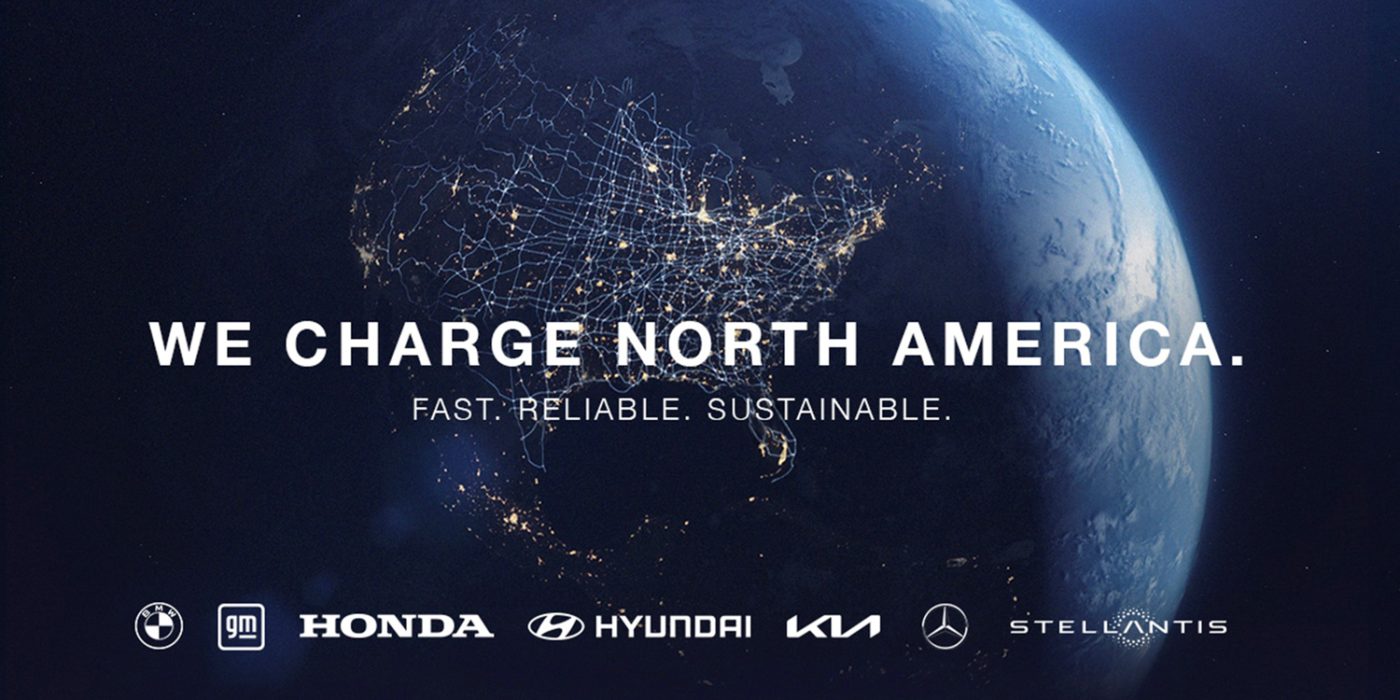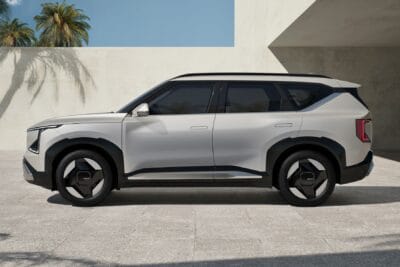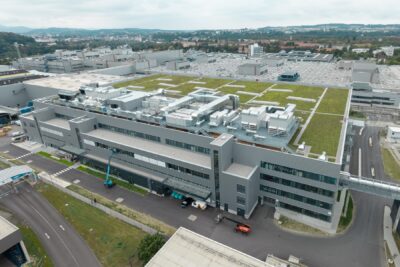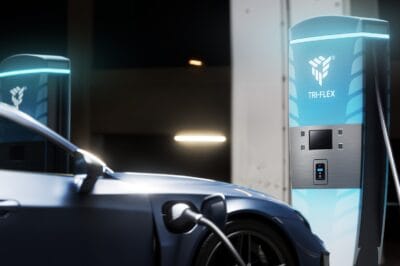Automotive manufacturers launch HPC network in North America
After the NACS boom, the next big development in fast-charging is on the horizon in North America: seven major car manufacturers have joined forces to build a fast-charging network with at least 30,000 charging points there.
BMW, General Motors, Honda, Hyundai, Kia, Mercedes-Benz and Stellantis have announced plans to establish a joint venture for this purpose before the end of the year, according to a press release published by all seven companies. The new charging stations will be accessible to battery-electric vehicles of all brands that use CCS or NACS connectors. Of the seven new partners, General Motors and Mercedes-Benz had committed to NACS for their North American models, meaning that they will install the NACS charging socket in their vehicles from 2025, and no longer the CCS1 connection.
The fact that the charging stations will have corresponding cables for both charging systems is important for the intended promotion: as is well known, the US government has made a CCS connection a prerequisite – other charging plugs can, but do not have to be offered. “The fast chargers are thus expected to meet or exceed the requirements of the U.S. National Electric Vehicle Infrastructure (NEVI) programme,” according to the notices.
The first charging stations of the merger are scheduled to open in the summer of 2024 in the USA and at a later date in Canada. Each location will be equipped with “several high-performance DC fast charging points”. However, no minimum or maximum number is mentioned, nor is the charging power specified yet – but it is likely to be at least 150 kW. The charging stations will be set up in easily accessible locations and, where possible, will offer canopies and amenities such as toilets, catering and retail – in the immediate vicinity or the same building complex.
Reliable charging network is the goal
What the partners do emphasise, however, is the reliability they are aiming for – reliability is consistently cited as an asset of the Tesla Supercharger network (and thus one of the reasons for the NACS change), along with distribution. In addition, there are to be some “flagship locations” that are to be equipped with “additional amenities for a first-class charging experience” in order to “provide a glimpse of the future of charging”. This is not described in more detail, but it could be a stay lounge or other services around the charging park.
According to the US Department of Energy, there were around 32,000 publicly accessible DC fast charging stations available in the US in July 2023 – with a planned 30,000 charging points, the new alliance would almost double that number. The North American Supercharger network currently comprises 12,000 charging points, but will continue to expand.
It is not yet known exactly what the new charging alliance means for the German carmakers’ previous plans. Mercedes had announced its own global HPC network in January, which was to start in North America. Since the Stuttgart-based company’s NACS announcement, it has been revealed that this network will support both CCS and NACS. Since all seven announcements are word-for-word as mentioned, no statement from Mercedes on the future of its own charging network is yet known. And the HPC network of VW’s subsidiary Electrify America, which was previously considered one of the most reliable CCS networks in North America, is now getting serious competition.
“North America is one of the world’s most important car markets – with the potential to be a leader in electromobility,” says BMW CEO Oliver Zipse. “Accessibility to high-speed charging is one of the key enablers to accelerate this transition. Therefore, seven automakers are forming this joint venture with the goal of creating a positive charging experience for EV consumers.”
Mercedes CEO Ola Källenius added: “The fight against climate change is the greatest challenge of our time. What we need now is speed – across political, social and corporate boundaries. To accelerate the shift to electric vehicles, we’re in favor of anything that makes life easier for our customers.”
It is also interesting to note that Hyundai and Kia are founding members of the alliance – the Korean companies had previously “looked into” NACS integration, but were concerned as the Superchargers are rated at 400 volts – and thus Hyundai Motor Group’s 800-volt models will not be able to take advantage of their fast charging capabilities. “Hyundai’s investment in this project aligns with our ‘Progress for Humanity’ vision in making sustainable transportation more accessible,” said Hyundai CEO Jaehoon Chang. “Hyundai’s expertise in electrification will help redefine the charging landscape and we look forward to working with our other shareholders as we create this expansive high-powered charging network.”
bmwgroup.com, mercedes-benz.com, stellantis.com, gm.com, global.honda, hyundai.com





0 Comments